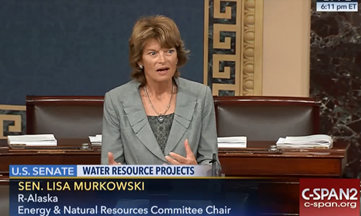Water Infrastructure Development Bill Passes Senate
Murkowski Votes for Legislation to Advance Alaska Projects and Boost Economic Development
WASHINGTON, D.C. – Today U.S. Senator Lisa Murkowski (R-AK) voted in favor of the Water Resources Development Act (WRDA), legislation that addresses infrastructure priorities on America’s coasts and rivers. The bill authorizes the Army Corps of Engineers to improve navigation and flood management, construct projects to mitigate storm damage, and to assist state and local governments with safety programs. The legislation also supports a wide range of water quality projects and programs through providing grants and loans to state and local governments, public water systems, and nonprofit organizations. WRDA passed the Senate by a vote of 95-03.
“I’m thankful that my Senate colleagues put politics aside and worked together to pass this crucial piece of legislation that will help so many communities across the nation, including Alaska,” said Senator Murkowski. “As our state grapples with budget woes, this bill will not only help move forward projects which serve as a lifeline to so many coastal communities, but will also provide for economic growth in our state. I’ve been fighting for many of these projects for a long time in communities all across Alaska – ranging from Saint George to Valdez – and I thank Senator Sullivan for his leadership on the Environment and Public Works Committee as we deliver this good news to Alaskans.”

(Click here to watch Senator Murkowski’s remarks prior to final passage of WRDA.)
Arctic Deep-Draft Port: Makes progress to build much-needed infrastructure in the region by instructing the Assistant Secretary of the Army in carrying out a feasibility study of an Arctic deep-draft port. This is an important step towards strengthening America’s Arctic presence, national security, and economic viability. In addition, the bill directs the Secretary of the Army to consult with the Secretaries of Homeland Security and Defense in order to identify national security benefits associated with an Arctic deep-draft port as a basis for determining feasibility.
Small, Remote, Subsistence Harbors: Included in the bill is an identical provision to Senator Murkowski’s amendment in the Energy & Water Appropriations bill, which expands the language of the Remote and Subsistence Harbors provision to take into account not only local needs, but also regional impacts and effects. When it comes to conducting a study of harbor and navigation improvements, this provision directs the Secretary to take into account the long-term viability, social and cultural value, and welfare of not only the community in which the project is located but communities located in the region that would be served by the project – allowing for the potential for more harbors in rural Alaska.
Alaska Native Corporations: Includes a provision that allows Alaska Native villages and regional and village corporations to be non-Federal sponsors of Corps projects and expands the existing authority of the Corps to accept funds from states and local governments to carry out water resources projects to apply to all projects, not just flood control, and expands the definition of state to include territories and Indian Tribes, including ANC’s.
Denali Commission: Senator Murkowski secured an amendment that will reauthorize the Denali Commission, enabling the Commission to continue doing work to build infrastructure in rural Alaska, and to carry out the new mission assigned by the President of being the lead agency in assisting environmentally threatened communities with issues such as coastal erosion.
Additional Bill Highlights:
- St. George Harbor: The bill expedites the process for construction of the harbor, and if deemed that a project is justified, allows for the project to proceed directly to project preconstruction, engineering, and design.
- Craig Harbor: Authorizes $28,960,000 in both federal and non-federal funds for the construction of the Craig Harbor Project.
- Little Diomede: Authorizes $32,317,000 in both federal and non-federal funds for the construction of the Little Diomede Harbor Project.
- Elfin Cove: Authorizes the Army Corps of Engineers to maintain the harbor, including addressing the threat of shoaling.
- Valdez Harbor: Allows development of a new small boat harbor to continue.
- Seward Lowell Creek Flood Diversion System: In order to reduce severe flood risk, the bill extends the responsibility of the system’s long term maintenance to the Army Corps of Engineers.
- Small and Disadvantaged Communities Grant Program: Assists small and disadvantaged communities, while prioritizing areas without basic drinking water or wastewater services.
As a member of the Appropriations Committee, Senator Murkowski has worked to fund critical water infrastructure projects administered by the Army Corps of Engineers and authorized by the WRDA bill, including securing a number of provisions to address Alaska’s unique infrastructure needs.








